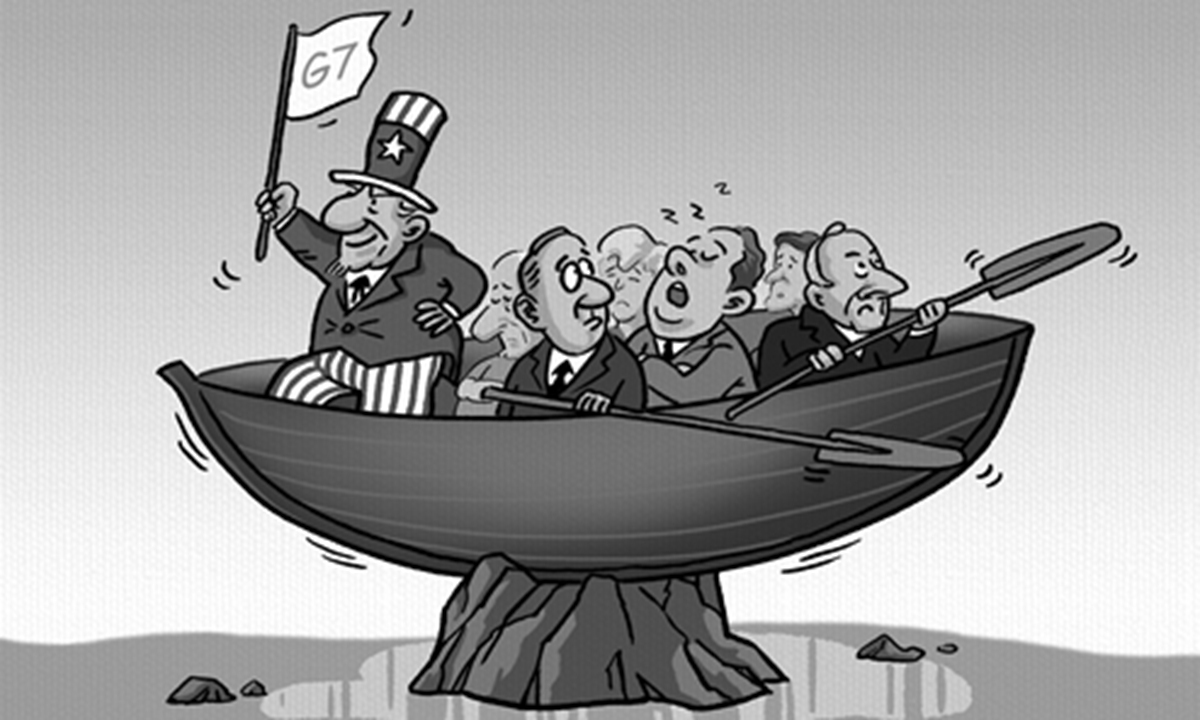
Illustration: Liu Rui/GT
The 47th Group of Seven (G7) summit will be held from Friday to Sunday in Cornwall, England. After attending the summit, US President Joe Biden will travel to Brussels, Belgium for the NATO summit. The White House said the trip will highlight Biden's commitment to restoring US alliances and revitalizing the transatlantic relationship.
As the G7 is a creature of the past age, its influence and power are no longer worth looking forward to. The fundamental reason is that the world's economic and political center of gravity has shifted eastward. When the G7 was set up in the 1970s, the seven Western countries were indeed the seven biggest players in the world economy.
However, great changes have taken place in some Asian countries since the 1970s, and the past glory in these seven countries had faded. Mechanisms such as the G20 have emerged in recent years. This has further diminished the influence of G7.
This year, G7 has invited India, South Korea and Australia to participate. Adding these three countries to the meeting aims to increase the weight of the US in the international economic and financial fields, and expand the values of the US and form a global "democratic" bloc.
On the one hand, they want to play the "alliance card" and further diversify the US-led mechanism. On the other hand, they want to expand the functions of the G7 financial mechanism against the backdrop that the US' influence in the international economic and financial fields has declined.
They could expect things to turn out as they have wished. But in the real world, such a strategy will hardly serve the US purposes, as the G20 - with the participation of more developing countries including China - is playing a more important role in the international economy.
Australia, India and South Korea might be interested in the idea that membership in the G7 may help raise their international status. However, original G7 members have different positions on the admission requirements of new members. Superficially, 10 countries may be more powerful than seven; however, each country has its own calculations and concerns over various interests. The expansion from seven countries to 10 will consume more energy and resources for the countries to coordinate their divergences. Not to mention reviving the diminished influence of the G7.
In addition, the US and European countries have sharply differing viewpoints toward China. European countries do not support turning the G7 into a "democratic" bloc against China.
There has been a decline in the competitiveness of the US and Western governance. But they have been unable to initiate substantive reforms. In the normal competition based on international rules, the US feels that it is being surpassed by its rivals. This is why it has begun to take political means other than true competition to hinder its rivals - from coalition formations to open suppression tactics.
This is a vicious competition. And the end result will be a systematic "de-Americanization" around the world. In the long run, it will not be China getting isolated from the world, but the US isolating itself from the world.
When the G7 was founded, the seven members all had their own calculations. In modern international relations, multilateral regimes, whether small or large, can hardly pursue the same goal as the members' national interests are different. The idea that the seven countries can do anything to align themselves with the US' position was, and remains, simply impossible.
The G7 was set up with the mission of strengthening international financial governance, but over the decades, it has turned out to be an absolute failure. The world should be inclusive, meaning that it should accept all kinds of ideas about governance from different perspectives. This will allow for a balanced international governance system. The G7 has no right to and should not exclude developing countries or other platforms for multilateral governance.
The global political and security structures and the international economic and financial order, established by the US after World War II and maintained up to this day, have become increasingly unsustainable. And a new world order is far from being formed. The G7 says it will defend the rules-based international order. But international rules should never be established by only seven countries or by the US itself. After all, the US is a hegemonic country that has once torn down the edifice of the international order.
The author is a senior research fellow at the China Institute of International Studies. opinion@globaltimes.com.cn




